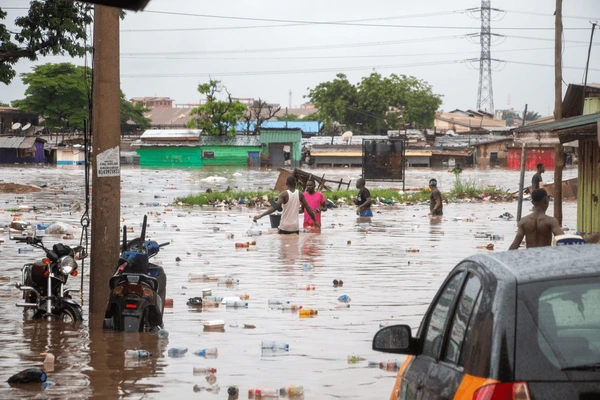Risk of floods in Ghana’s capital of Accra blamed on city planning
3 min read
Environmental groups in Ghana are raising alarms about Accra’s growing vulnerability to flooding, urging the government to prioritize flood defenses and other preventive measures. With nearly 3 million people residing in the capital, the city’s population has surged in recent years, leading to overcrowding and the expansion of residential areas into high-risk flood zones. This situation is worsened by the increasing frequency and intensity of rainstorms, which are attributed to climate change.
Residents like Adiza Abdul Mumin, who lives in Adabraka—a flood-prone neighborhood in Accra—have seen firsthand the devastating effects of regular flooding. Over the past 15 years, Adiza has struggled with floods during the rainy season, which often inundate her home. “During the rainy season, things get really bad. I barely sleep well at night because the flood fills up my room. Any time that happens, my blood pressure goes up,” Adiza shared. Such conditions leave many residents concerned about the long-term health risks, particularly the spread of waterborne diseases in the wake of floodwaters.
The root cause of Accra’s flooding issues, according to environmentalists, lies in poor urban planning and inadequate enforcement of building regulations. Malik Mino Ereira, an environmentalist with Planet Waves, explains, “It is because of poor planning, as a result of city authorities not enforcing the laws. The second one has to do with urbanization, because people come, and they need a place to stay. So, they will clear the vegetation and get a place to stay.” The rapid and unplanned urban expansion has led to homes being built in low-lying areas, making them more susceptible to flooding.
Additionally, Accra’s inadequate infrastructure, particularly clogged drains filled with plastic waste and silt, exacerbates the flooding problem. These blocked drains prevent proper water flow, causing rainwater to accumulate and flood streets and homes. Ereira calls for better urban planning, urging the creation of spaces that allow water to flow freely. He also emphasizes the importance of addressing sanitation issues, advocating for the reduction of waste dumping in open gutters. “When we build, we will create spaces where water will pass so that the flooding will not occur. And secondly, we should address the sanitation situation, so that people will not use the gutters as a conduit to dump their waste,” Ereira said. He further urges wealthier individuals and developers to integrate green spaces into their projects, as trees and plants can help absorb excess water and reduce flooding.
Despite some efforts by local authorities to address flooding, such as dredging drains and demolishing buildings along waterways, these temporary measures have not been enough to prevent recurrent flooding. Environmentalists argue that a more comprehensive approach is needed to tackle the root causes of flooding. A complete overhaul of the city’s housing infrastructure is essential, they say, as rising sea levels and increased rainfall pose a growing threat to coastal communities like Accra.
With climate change exacerbating extreme weather events, the need for a long-term, sustainable solution to Accra’s flooding problem has never been more urgent. While local authorities continue to struggle with these challenges, residents like Adiza face increasingly difficult decisions about whether to stay in their homes or leave for higher ground. The government’s role in addressing these issues is crucial, as many fear that without significant changes to urban planning, sanitation, and flood defenses, Accra will continue to face devastating floods.
As Accra’s population continues to grow and the climate crisis deepens, the urgency for action to prevent further damage and loss of life increases. The government must take bold steps to improve urban planning, enforce existing regulations, and invest in infrastructure that can withstand the increasing pressures of flooding. Without these changes, Accra will remain highly vulnerable to the dangers of floodwaters, and its residents will continue to face the growing threat of displacement and health risks.






